Archive Record
Images
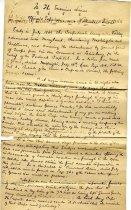
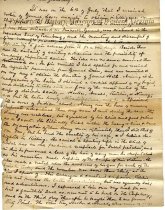
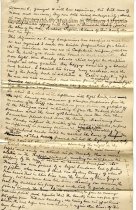
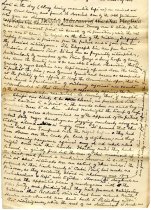
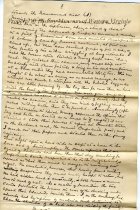
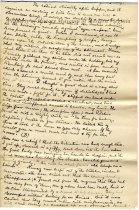
Additional Images [6]
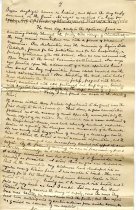
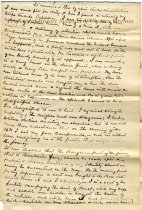
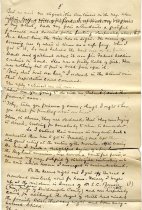
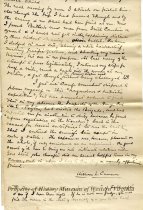
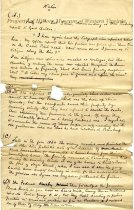
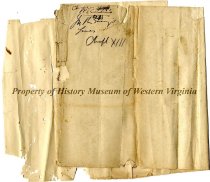
Metadata
Title |
In the Enemies Lines by William E. Cameron |
Dates of Creation |
1895 |
Scope & Content |
As each page is extra long, it was scanned a half-page at a time. The writing is somewhat difficult to read and the folds of the paper have made it impossible to read some words. The last page (11) contains notes A, B, C, and D, which refer to incidents related in paragraphs within the letter. William E. Cameron was born in Petersburg in 1842 and attended Hillsboro Military School and Washington College in St. Louis. He was a drillmaster with the Missouri state troops. He signed up with the 12th Virginia Infantry as a private in 1861, became Adjutant in 1862, and was wounded at 2nd Manassas. He became a lieutenant then captain (AAIG/inspector) for General Mahone and Weisiger in late 1863. After the war, he was newspaper editor at Petersburg and Norfolk. He was the mayor of Petersburg for three terms, and was elected state governor in 1881. He died in January 1927, and is buried in Blandford Cemetery in Petersburg. In July of 1864, Gen. Jubal Early advanced into Maryland and threatened Washington and Baltimore. This caused General Grant to detach troops from his command at Petersburg and send them to protect Washington. A letter from General Meade to Grant on July 10 states the following. (Cameron uses the Official Records as a reference.). A Negro woman living near the Weldon Railroad heard that General Lee would grant 30 days leave to any who captured a Yankee soldier. Meade thought the information plausible as Lee needed to know what troops would be leaving for Washington. When the Sixth Corps did leave they raised a lot of noise by beating drums and also making bonfires. The next morning the Confederates advanced against the pickets of the Second Corps, crying that the Yankees had gone. It was true as days prior (July 7), Lee had issued a circular offering special treatment to the officer or soldier who should obtain accurate information of that subject afore-mentioned. He wrote to Jefferson Davis that the information he had received from deserters, prisoners, scouts and citizens was that Rickett's Division of the Sixth Corps had left Grant's lines. Cameron states that it was the 6th of July when he received word that Lee needed to obtain intelligence on Grant's possible movements. Cameron was attached to Davis's Brigade in Heth's division as inspector general and was tired of the boredom, dust, heat, and enemy pickets while being in the trenches. He thought the idea of obtaining the required information would be an exciting adventure. In short order he obtained permission from General Davis, and immediately headed for Heth's headquarters. Here he obtained approval for his project and the authority to take with him some of the best divisional scouts; Hooker, Arnold, Ritchie and Nunez. The first three were from Mississippi and the latter a Spaniard with Indian blood. Nunez was a hero of many adventures as his daring was reckless, but was equaled by his skill. He lived within enemy lines and knew the organization of their army better than Cameron knew the organization of his own army, but Nunez had the cruelty of his race, and seemed to delight in killing. He carried a sporting rifle which had a receptacle which contained a lock of hair of every man he had dispatched. The same practice his ancestors had in saving enemy scalps. Nunez also made notches on the woodwork of his gun for each of the lives he took, and at that time the number was more than thirty. His companion, Richie did not do as Nunez did, but was equally brave and adventurous. Cameron had mentioned at one time that he would like a hat and gauntlets but such items were known not to be found in the Confederacy. Within three days Nunez brought them to Cameron from City Point. Hooker and Arnold were from Cameron's command. They were younger and less experienced, but both with nerve and reason. Hooker died at Hatcher's Run in October, and Arnold in an unfortunate dispute with citizens in Dinwiddie County just at the close of the war. This was at the same time that Captain Adams of that county also died. At Cameron's insistence, they wore Confederate uniforms (scouts usually did not) with light blue cavalry cloaks. Their baggage was a blanket and rubber. Cameron carried two Navy revolvers and in addition a Colt repeating rifle. All were mounted, and unless surprised, or forced to fight, they were expected to make more use of their horses' heels on the trip than of their weapons. With light hearts and the good wishes of Heth's staff, they galloped off to the Halifax Road intending to force the Federal picket somewhere at the head of the Blackwater River, and take the Jerusalem Plank Road. Obtaining information from Confederate cavalry on the enemy's videttes, they had no difficulty in passing between them below Lee's Mill. Traveling on country roads they reached the house of Mr. Proctor, which they passed on the highway and drew rein at Hawkinsville. There they spent the night in the thicket at the back of Major Belsh'es farm. The next morning, heading for Waverly, they stopped at a station on the Norfolk Railroad and had breakfast. At Waverly they were joined by a young lad of fourteen or fifteen who guided them on their journey to the river. On the way they learned that the country was full of stragglers from Wilson's Cavalry who had been cut off at Reams Station the week before and were seeking to regain their lines. Later in the day (the boy having left) they arrived at Surrey Court House, which was deserted except for an old gentleman who gave them dinner. Here they planned two expeditions. Arnold and Nunez were to strike for the river at the nearest point in search of information; while the rest were to spend the night on the line of the Military Telegraph hoping to take a prisoner from the expected patrol and gain from him the desired intelligence. The telegraph ran from Fort Powhatan to Inam's Point. It had so often been interrupted by Prince George cavalry that special guards of Negro soldiers moved up and down the route of the line. General Grant had become so frustrated in his efforts to keep open his line of communications that he had issued a proclamation of outlawry against all scouts apprehended in the territory. Knowing of their fate if caught they proceeded with caution to a point in the woods where they could lie in ambush. About midnight, they heard the tramp of hooves and the sound of voices of the approaching patrol. About forty black cavalrymen jogged carelessly along and were talking aloud in angry tones. They had been admonished the day before for lack of vigilance and were swearing vengeance against any damned rebel who came into their hands. Waiting till the cavalry file had passed, Cameron, Hooker and Ritchie fell in behind and followed them, a short distance in the rear. They took great pleasure in cutting the line at short intervals for about three miles. They followed almost to Cabin Point, but could not take a prisoner. Just before abandoning their pursuit, they fired a volley as a parting salute. See note A. The next day they met up with the other party, which had satisfactory information that it was Rickett's Division that had been ordered north. Hooker and Arnold were sent back to Petersburg with the gathered information, while the rest moved on to the Nansemond River. They did not encounter any of the enemy until late in the afternoon when a cloud of dust announced their approach. Hiding in a field of corn they watched the column of enemy cavalry pass. At first they passed well closed up but later groups of five or six passed, and then two or three stragglers would pass at long intervals. While Cameron held the horses, Richie and Nunez crept forward to the road. The two men then waited until one or two stragglers were close, when they would jump out and capture the stragglers, until thirty-two were accumulated. Under the threat of death, they were told to remain silent, until the rest of what was left of the passing column was out of sight. Because the captured patrolmen said they were tired of fighting, it was determined to give them parole. They were given their papers and sent off to Franklin Station the nearest Confederate post. That night they stopped at a house in Southhampton. Feeling there was no danger, they retired for the night. The two troopers slept outside with the horses, while Cameron remained inside. With symptoms of malaria he was given a dose of apple brandy by the hostess that helped him sleep. He awoke to the sound of shots, oaths and the trampling of hoofs. Cameron realized his chance for escape was slim, so he gathered his clothes, hid his pistol in the pillow, and waited for what would follow. He heard heavy footsteps coming up the stairs. Clutching his revolver, he resolved to make a fight of it. When the door blew open it was Ritchie, who entered and told Cameron to put on his clothes as they had killed two of the enemy. If the rest had not gone, they must run for the horses. See note B. Putting his clothes on, he went down the hall, passing the host and hostess. Nunez slipped out of the kitchen to reconnoiter. He soon cried out that the enemy had disappeared. There had been four of them. Beside the two killed, one had been hurt and the other dismounted. The enemy had left without finding their horses, which the men quickly saddled before any enemy reinforcements returned. Cameron and the two troopers spent the day and night deep in the woods, and were not disturbed. The next day found them riding through the village of Chuckatuck, their destination being the mansion of Squire Dick Riddick, a true patriot and generous host. Here they found lavish accommodations which were received gratefully. Riddick was a true Confederate and had already rendered valuable service by reporting the movements of the Federals. Cameron now received up-to-date information as to the reinforcements sent against General Early. It was decided to start that night in order to get this information to General Lee, but Cameron's illness was worse as he had a high fever and could not travel. It would be up to his two companions to return to Petersburg while he remained to recuperate and then return as best he could. Ritchie and Nunez reached the army and passed on their information, but earlier information from other sources had already been delivered. At Mr. Riddick's, Cameron was being nursed back to good health by two Virginia ladies, but, after a few days, rumors of his presence had reached the Federal commander at Suffolk. Due to the vigilant friends of Mr. Riddick he was able to leave the house and was moved to a safe place in the forest. Here, with his horse nearby, he stayed and received additional food and entertainment. After regaining his strength it was time for him to start on his return journey. It was decided that the most dangerous part of the journey, that to Broadwater Ferry, should be made so not to bring suspicion to his identity. On the day of departure a cart was brought to his location into which he and one of the Virginia ladies climbed. Sitting on the seat, Cameron wore a coat that belonged to the lady's father, while Cameron's cape and saddle were hidden in the hay at the bottom of the vehicle. The lady had placed her side-saddle on Cameron's horse. They met no one who was interested in the hay. A half-mile from the ford, Cameron finished putting on his uniform and mounted his horse. He bade farewell and continued on to the river. See note C. In order to cross the river, an individual would have to use a rope ferry. When Cameron arrived, the boat was on the opposite bank and gathered around it were five Federal soldiers with carbines. Putting on a bold face Cameron demanded they bring the boat over to him. The soldiers wanted to know what he was going to do with them. To which Cameron's reply was that he was going to make them his prisoners, or have them shot for being in Confederate lines. The soldiers told him that they all were trying to desert and were looking for someone to whom they could surrender. Cameron entered their names in his notebook, and instructed them on how to get to Franklin. Crossing the river with great relief, he made his way to the Urquhart Mansion, where he received instructions on the route he should take, but he misunderstood. On the second night he wandered about aimlessly, but finally came to the residence of Dr. E. C. Barrett, who at one time had been a judge in Southampton County. That very night a child died within the house. The next morning he struck the Confederate picket line. He had passed through the Federal lines to get there and had not been shot at once. Now the South Carolinians on guard would not allow him approach within explaining-distance without claiming a bullet. Cameron dodged in and out for hours, even showing a white handkerchief, making gestures, shouting his name and business, but to no avail. At last, he gave up trying to pass legitimately, walked back a half mile, made for a break in the woods, and got through to Reams' Station without incident. See note D. When he got back to camp, proud of the fact that he had accomplished a hazardous and patriotic expedition, he found that in his absence the Inspector of the Army had visited the Brigade and had reported him for inattention to duty. The inspector had found refuse, and vegetables in the trenches. It was the last time Cameron entered the enemy's lines except in order of battle. He states that he was proud of his experience, which has made him a great friend of General Heth. Note A. This note is a report to General Butler from Colonel Imis. He reports he has again repaired the telegraph line, and that his patrol was fired upon three times on the Cabin Point Road. He asks what he should do as to the citizens along the line. Four citizens were arrested as hostages, but the cutting of the lines was repeated throughout the Summer and Autum and Colonel Imis finally complains that it takes his whole force to guard and repair the lines. Note B. It was reported that orders were issued to burn the house, but the occupants saved their property by saying they refused to shelter the scouts; thus explaining their presence in the yard. They did not say anything about Cameron. Cameron regrets not knowing the name of the people, but remembers the man saying he had relatives in Petersburg. Note C. In late 1864, the Federals resented and were fed up with the patriotic acts of the Riddicks. They were banished from their home, and the family went to Petersburg, where they lived during the winter in one of the houses in Smith's Row at the front of High Street. Cameron was able to visit the Riddick ladies and pay his respects in return for their kindness. He states that Squire Riddick has since passed away. Note D. The Federal Cavalry then picketed the Jerusalem Plank Road as far east as Lee's Mill, turning then northward toward Prince George Court House. They kept scouting or patrolling, keeping in constant motion as far as Proctor's, and Cameron missed them by an hour or two. |
Year Range from |
1895 |
Creator |
Cameron, William E. |
Year Range to |
1895 |
Subjects |
Absence Adventures African Americans Afro-Americans Ambushes Ancestors Apple brandy Authority Babies Baggage Blankets Blood Boats Bonfire Brandy Bullets Bushwhacker Camp Capital Captures Carbines Careers Cart Cavalry Citizen Civil War Civil war battles Cloaks Clothes Colts Command Companion Confederate Army Confederate officers Confederate soldiers Confederate veterans Corn Danger Deception Deserters, Military Despair Detachment Discussion Dispatch Drums Dust Enemy lines Entertainment Episode Escapes Escort Experiences Farewells Farms Federal Ferry Fever Field Forests Furlough Gauntlet Gestures Guards Guests Guns Hair Handkerchiefs Hay Headquarters, Military Heat Heroes Highways Hobbies Hoof Horse Host Hostages Hostess Idea Illness Indians Information Inspector General Intelligence Intruder Journey Knowledge Maidens Malaria Mansions Message Mint julep Missions Navy six-shooter Negro Neighborhoods Notches Note book Oaths Parole Patriotism Patrols Picket line Pickets Pillows Ponies Proclamations Railroad Rebels Reconnaissance, Military Refuse Reinforcements (military) Revolvers Rewards Rifles River fords Rivers Roads Route Rubber Saddles Scalps Scouts & guides Scouts, Military Service (military) Sleep Soldiers Squad Staff Stairways Stragglers Strength Telegraph & telephone poles Telegraph lines Territory Thicket Trench Trips Troops Uniforms Vegetables Victims Vidette Vigilance Villages Volley Volunteer Weapons Wires, Utility Woods Yankee Yards |
Search Terms |
2nd Corps 6th Corps Baltimore, Maryland Blackwater River Broadwater Ferry Chuckatuck City Point, Virginia Civil War Confederacy, the Confederate Army Confederate Veterans Davis's Brigade Dinwiddie County, Virginia Fort Powhatan Franklin Station Halifax Road, Petersburg, Virginia Hatcher's Run, Virginia Hawkinsville, Virginia Heth's Division High Street Inam's Point Jerusalem Plank Road, Petersburg, Virginia Lee's Mill Maryland Mississippi Nansemond River Norfolk Railroad Petersburg, Virginia Prince George County, Virginia Ream's Station, Virginia Riddick Mansion Second Corps Sixth Corps Smith's Row Southhampton County, Virginia Surrey County, Virginia Surrey Court House War Between the States War Talks of Confederate Veterans Washington City D.C. Waverly, Virginia Weldon Railroad Wilson's Cavalry |
People |
Adams, [unknown] Arnold, [unknown] Barrett, E. C. Bernard, Geo. S. Bernard, George S. Butler, Benjamin F. (Beast) Maj. Gen. Butler, Matthew Calbraith Cameron, William E. Clay, Sydney Davis, Jefferson Davis, Joseph Robert Early, Jubal Anderson Grant, [Ulysses S.] Heth, Henry, Imis, [unknown] Lee, Robert Edward Meade, George [Gordon] Nunez, [unknown] Peyton, H. E. Rickette, [unknown] Riddick, Richard (Dick) Ritchie, [unknown] |
Event |
Civil War |
Collection |
George S. Bernard Collection |
Imagefile |
025\200975159.JPG |
Number of images |
12 |
Object Name |
Letter |
Object ID |
2009.75.159 |
Extent of Description |
6 pages, size 7 1/2" x 22" |

